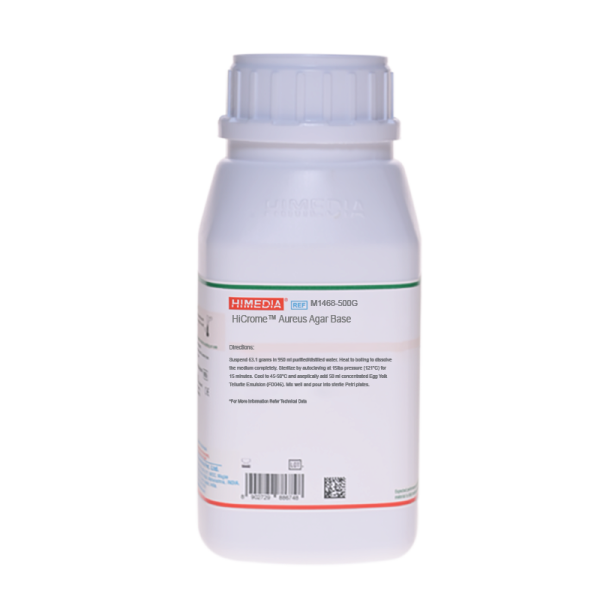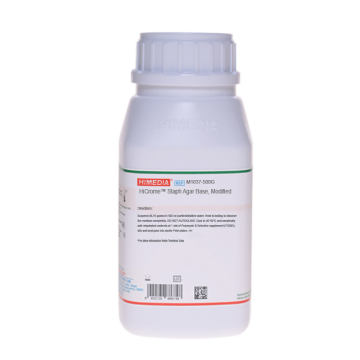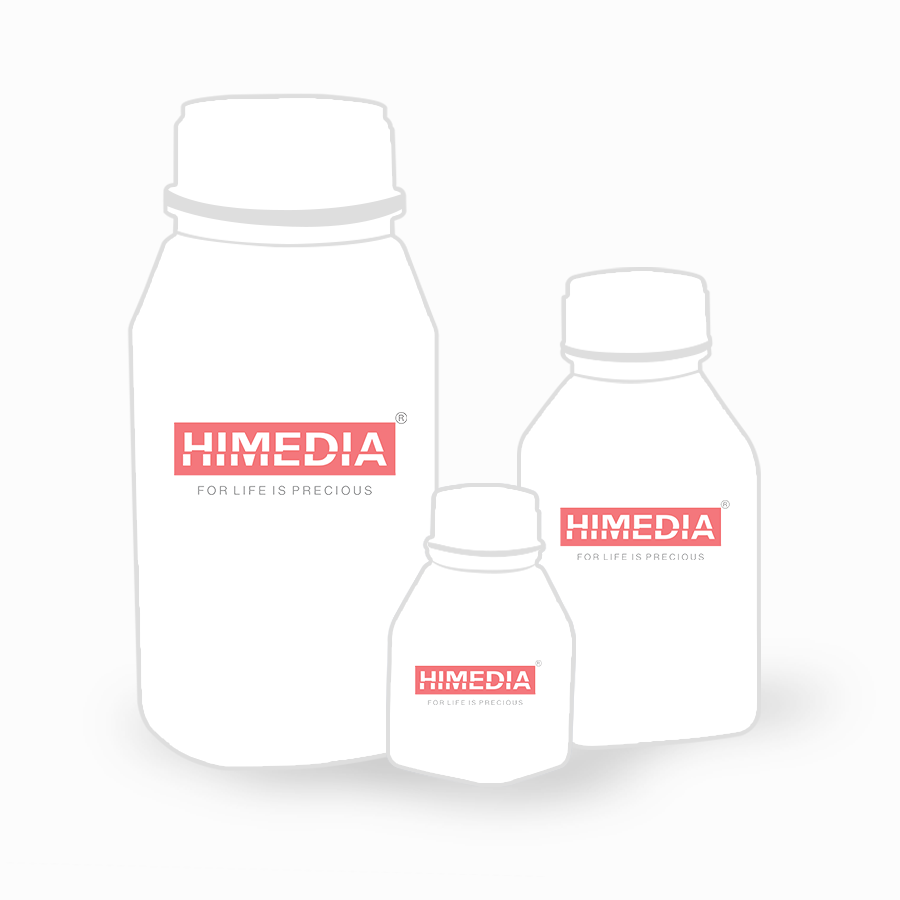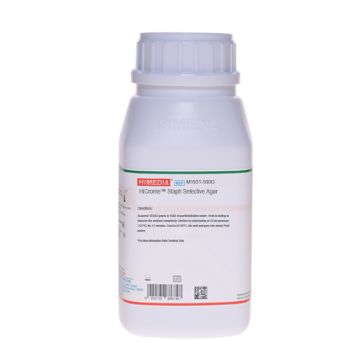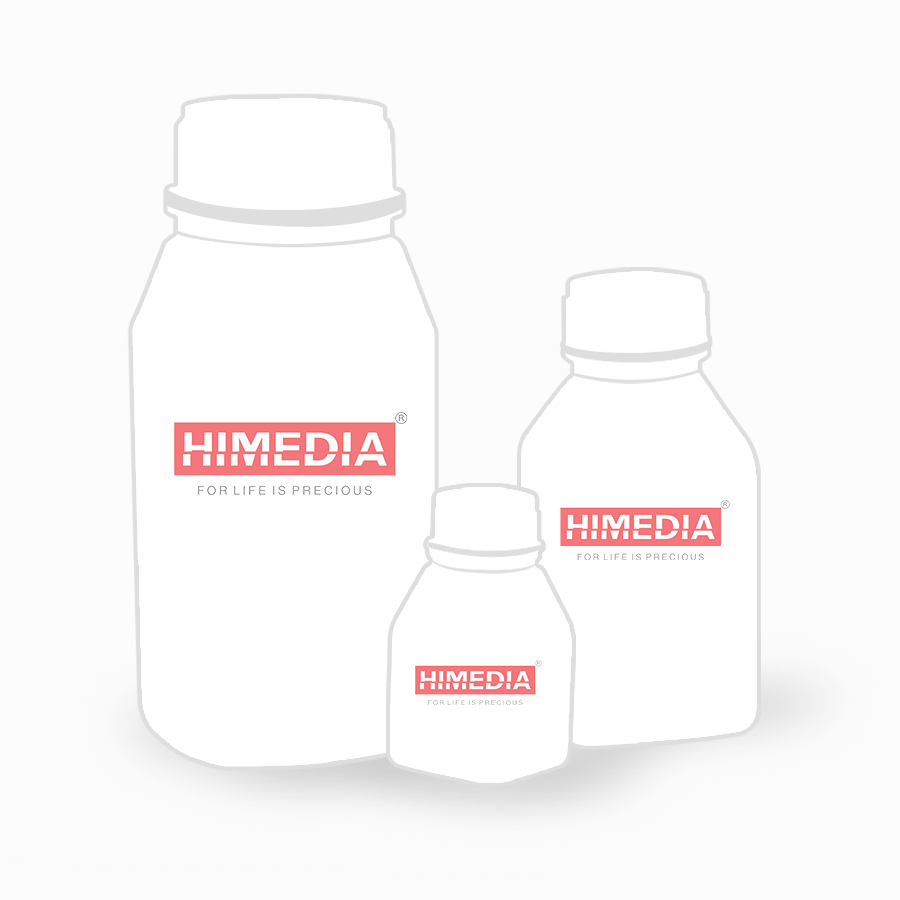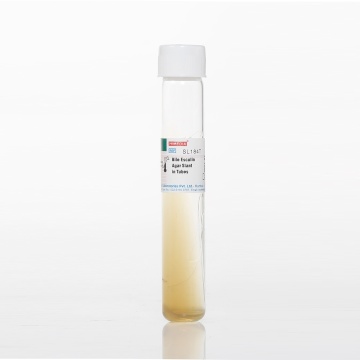 Your enquiry has been submitted
Your enquiry has been submitted
HiCrome® Aureus Agar Base
Intended use
Recommended for isolation and identification of Staphylococci from environment samples.
Composition**
| Ingredients | g / L |
|---|---|
| Tryptone | 12.000 |
| Gelatin peptone | 3.000 |
| HM Peptone B# | 6.000 |
| Yeast extract | 5.000 |
| Sodium pyruvate | 10.000 |
| Lithium chloride | 5.000 |
| Chromogenic mixture | 2.100 |
| Agar | 20.000 |
Final pH ( at 25°C): 7.0±0.2
**Formula adjusted, standardized to suit performance parameters
# Equivalent to Beef extract
Directions
Suspend 63.1 gram in 950 ml purified/distilled water. Heat to boiling to dissolve the medium completely. Sterilize by autoclaving at 15lbs pressure (121°C) for 15 minutes. Cool to 45 - 50°C and aseptically add 50 ml concentrated Egg yolk Tel Emulsion (FD046). Mix well and pour into sterile Petri plates.
Principle And Interpretation
HiCrome® Aureus Agar Base is recommended for isolation and enumeration of coagulase positive Staphylococcus aureus from environment samples. Coagulase positive S. aureus gives brown black colonies with clear zone around the colony whereas S. epidermidis gives slightly brownish colonies. Other organisms give either colorless colonies or bluish coloured colonies due to the presence of chromogen. Listeria monocytogenes colonies are bluish in colour whereas Bacillus, E. coli and Micrococcus give colorless colonies.
Tryptone, Gelatin peptone, HM Peptone B and yeast extract provide nitrogenous and carbonaceous compounds and other essential growth nutrients. Sodium pyruvate protects injured cells, helps recovery and enhances growth of Staphylococcus. Lithium chloride and potassium tellurite inhibit most of the contaminating microflora except Staphylococcus aureus (1). Due to addition of egg yolk, proteolytic bacteria produce a clear zone around colony (1).
Type of specimen
Food samples
Specimen Collection and Handling
For food samples, follow appropriate techniques for sample collection and processing as per guidelines (2). After use, contaminated materials must be sterilized by autoclaving before discarding.
Warning and Precautions
Read the label before opening the container. Wear protective gloves/protective clothing/eye protection/face protection. Follow good microbiological lab practices while handling specimens and culture. Standard precautions as per established guidelines should be followed while handling specimens. Safety guidelines may be referred in individual safety data sheets.
Limitations
- Though the medium is recommended for detection of coagulase positive Staphylococcus aureus, other bacteria may grow.
- Individual organisms differ in their growth requirement and may show variable growth patterns on the medium.
- Each lot of the medium has been tested for the organisms specified on the COA. It is recommended to users to validate the medium for any specific microorganism other than mentioned in the COA based on the user's unique requirement.
- Further biochemical and serological test are to be carried out for confirmation.
Performance and Evaluation
Performance of the medium is expected when used as per the direction on the label within the expiry period when stored at recommended temperature.
Quality Control
Appearance: Cream to yellow homogeneous free flowing powder
Gelling: Firm, comparable with 2.0% agar gel.
Colour and Clarity of prepared medium: Yellow coloured opaque gel forms in Petri plates.
pH: 6.80-7.20
Cultural Response
Cultural characteristics observed with added Egg Yolk Tel Emulsion (FD046) after an incubation at 35-37°C for 24-48 hours.
| Organism | Growth | Colour of Colony | Recovery | Lecithinase activity |
|---|---|---|---|---|
| Staphylococcus aureus subsp. aureus ATCC 25923 (00034*) | good | brown-black | 40-50% | Positive reaction, halo or clear zone around the colony |
| **Bacillus spizizenii ATCC 6633 (00003*) | none to poor | colourless | <=10% | Negative reaction |
| Escherichia coli ATCC 25922 (00013*) | none to poor | colourless | <=10% | Negative reaction |
| Listeria monocytogenes ATCC 19112 | fair - good | bluish | 30-40% | Negative reaction |
| Micrococcus luteus ATCC 10240 | none to poor | colourless | <=10% | Negative reaction |
| Staphylococcus epidermidis ATCC 12228 (00036*) | none to poor | yellow-slight brownish | <=10% | Negative reaction |
Key : *Corresponding WDCM numbers.
Storage and Shelf Life
Store between 15-25°C in a tightly closed container and the prepared medium at 2-8°C. Use before expiry date on the label. On opening, product should be properly stored dry, after tightly capping the bottle in order to prevent lump formation due to the hygroscopic nature of the product. Improper storage of the product may lead to lump formation. Store in dry ventilated area protected from extremes of temperature and sources of ignition. Seal the container tightly after use. Product performance is best if used within stated expiry period.
Disposal
User must ensure safe disposal by autoclaving and/or incineration of used or unusable preparations of this product. Follow established laboratory procedures in disposing of infectious materials and material that comes into contact with sample must be decontaminated and disposed of in accordance with current laboratory techniques (3,4).
Reference
- Baird Parker, Ac (1962) J appl. Bact., 25:12.
- Salfinger Y., and Tortorello M.L., 2015, Compendium of Methods for the Microbiological Examination of Foods, 5th Ed., American Public Health Association, Washington, D.C.
- Isenberg, H.D. Clinical Microbiology Procedures Handbook. 2nd Edition.
- Jorgensen, J.H., Pfaller , M.A., Carroll, K.C., Funke, G., Landry, M.L., Richter, S.S and Warnock., D.W. (2015) Manual of Clinical Microbiology, 11th Edition. Vol. 1.
| Product Name | HiCrome® Aureus Agar Base |
|---|---|
| SKU | M1468 |
| Product Type | HiCrome™ |
| Physical Form | Powder |
| Origin | Animal |
| Packaging type | HDPE |
| References | 1.Baird Parker, Ac (1962) J appl. Bact., 25:12. |



